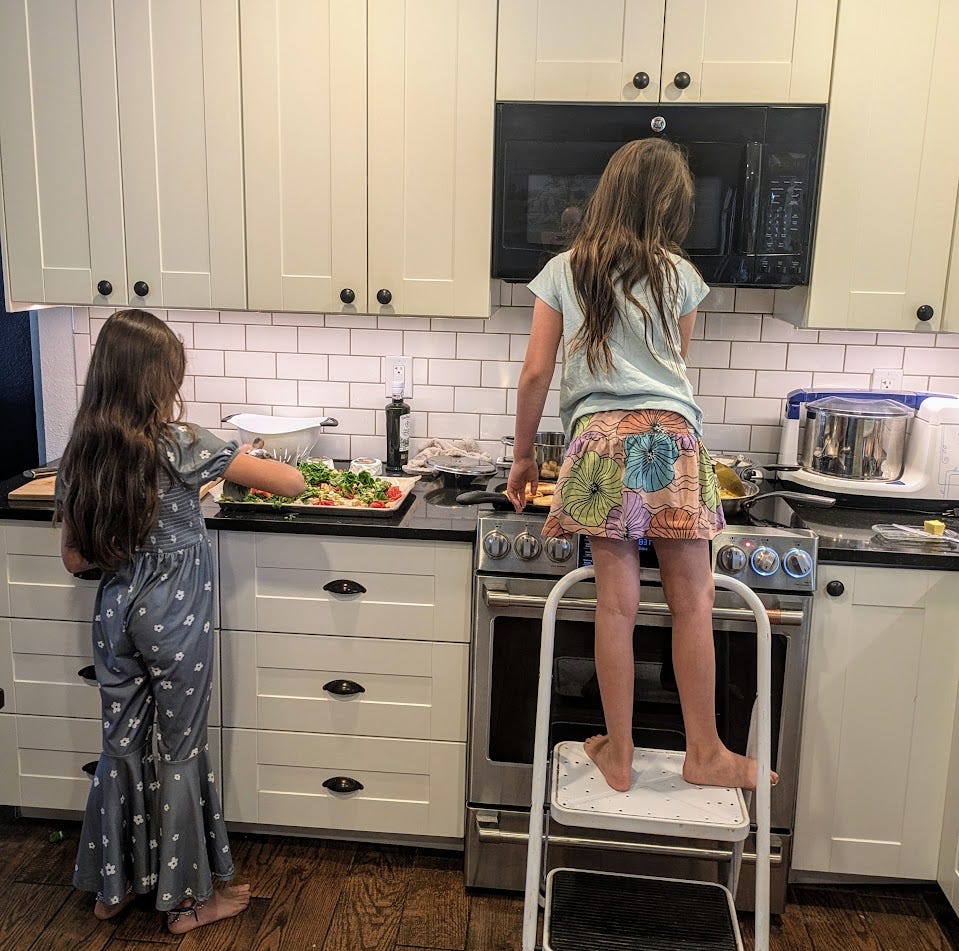✨Daily Chores for Kids: Simple Habits to Transform Your Home
A Special Treat Today👇
When I first read Mollie Donghia ‘s post from This Evergreen Homeschool about chores, I knew it was something special. Chores come up again and again in my conversations with veteran homeschoolers for the Tried & True Homeschooling podcast. Chores aren’t just about keeping the house running. They are about raising capable, confident kids who will one day run homes of their own. Mollie captures this beautifully, so instead of reinventing the wheel, I asked if I could share her piece with you. Her writing is warm, hopeful, and full of practical wisdom—I hope her insights inspire and empower you on your homeschooling journey.
If you want more of Mollie’s incredible wisdom, you can find her on her Substack This Evergreen Homeschool
✨Daily Chores for Kids: A Simple Habit That Transforms Your Home by Mollie Donghia
If you asked me to name one habit that unlocked smoother mornings, calmer evenings, and more helpful kids, there’s no doubt in my mind it would be this…our daily chore rhythm.
Several years ago when our oldest was about four, we first introduced chores. I anticipated teaching her a few valuable life skills that would help her keep a tidier room and be more responsible with her belongings. However, what we’ve gained over the years of consistent, daily effort far outweighs this expectation and has been nothing short of a game changer that’s transformed our life at home with four young kids.
The change didn’t happen overnight and it certainly wasn’t an easy process, but the compounding interest of small, daily tasks has been one of the greatest habits we’ve taught our kids.
In this post, I’ll share how and why we start a chore routine, the steps of implementing it, a glimpse at how chores currently look in our home, and the payoffs we see week to week. In another post, I’ll break down age-appropriate chores and include a free customizable download of the chore chart we’ve used for years. So save this post for reference and stay tuned for Part 2!
Begin at Three
By age three, our children are naturally eager to help so this has always seemed like the perfect age to begin. The key is choosing simple, age-appropriate chores that can be easily learned, practiced, and repeated over and over again until they can do the task independently. Chores such as folding washcloths, making their bed, taking out the recycling, getting themselves dressed, and cleaning up the playroom were a good place to begin.
At this age, we weren’t aiming for perfection at all— we were building muscle memory with a repeated simple habit. Teaching them these small first steps allowed them to gain confidence in their abilities, show how they can be a valuable help to our family, and gain independence towards taking on bigger tasks down the road.
Teach Thoroughly, Then Step Back
As adults, it takes daily, consistent effort to make any new habit sustainable. This is no different for kids. I’ve talked with many parents about chores and one common question rises to the surface… “How do I teach my kids to do their chores independently and without constant reminders?”.
I have a theory of why many chore efforts fall short and parents are left wondering why their kids haven’t developed consistency with the habit— parents don’t take enough time to model, assist and observe their child performing the chore before releasing them to do it independently.
Daily chores must be taught through modeling and with clear expectations, gently corrected until they’re done right, and practiced over and over again until the habit can be done independently.
Here’s my 4-step process that I use when teaching a new chore to my kids…
Model – I perform the chore while showing and telling them what I’m doing— “I’m pulling the sheet and bed covers up to the top, making sure they’re smooth, and finally putting the pillow, blanket, and stuffies neatly where they belong”. This sets a clear expectation of how the chore is done thoroughly.
Assist – Then, we repeat the chore side‑by‑side, my hand guiding theirs only when needed by gently showing them how they can do it too. This isn’t a one-time thing, but done for as many days or weeks as it takes until the child is able to do the chore without my help. Make sure you don’t rush this step.
Observe – Next, they try the chore by themselves while I watch. I make a big effort to praise them for success but also gently correct as needed.
Release – Finally, when I feel confident that my child has been taught correctly, has had many practice opportunities, and can do the job without me watching, I release them to this final stage. I still check regularly to make sure they’re doing the job well, but don’t micromanage as perfection isn’t the goal.
A Peek at Our Daily Chore Routines
Currently at the time of writing this post, my kids are 9, 7, 5, and 2. Our three oldest kids have their own daily chore routine where they earn a small allowance based on the amount of chores they do and whether the job is done thoroughly. Our 2 year old has not yet begun any formal chores but observes and helps his siblings occasionally.
Here’s a look at what a normal weekday looks life for us as a homeschooling family…
7:30 AM- The kids are up and begin their morning routines. They make their own breakfast, get dressed, brush teeth, make beds, and do their morning chores.
My 9-year old is responsible for cleaning up breakfast (loading dirty dishes into the dishwasher, wiping down counters, vacuuming the kitchen).
My 7-year old unloads the dishwasher, tidies up the schoolroom and playroom, vacuums one room, sprays and sanitizes the toilet (because with three little boys, it’s needed!), and empties our toy bin from the previous day’s playtime.
My 5-year old takes out the recycling, makes his bed, and cleans up the boys’ bedroom.
11:30 AM- We’re nearly through with our morning schoolwork by now so my 9-year old takes on another big chore— making all the kids lunches. The boys do a pre-lunch tidy where they reset the schoolroom and any play area.
5:30 PM- My 9-year old daughter sets the table while I make dinner.
6:30 PM- After dinner, my 5-year old gathers the dirty cloth napkins and puts them in the hamper, my 7-year old sprays and wipes all the chairs, and my 9-year old cleans up dinner (clears the table, loads the dishwasher, washes dishes, puts leftovers in the fridge, wipes counters, vacuums the kitchen).
Laundry- My kids are also responsible for folding and putting away all the laundry too. Every Friday, I do five loads of laundry. My 7 and 9-year old fold the laundry and neatly place it where it belongs.
Saturday Morning Power Hour- Every Saturday morning, we do a power hour of cleaning inside the house. I write small tasks on sticky notes for the kids to grab and complete that chore. It’s a family effort and takes only a small amount of time if we all work together.
5 Payoffs We See Every Week
Teaching our kids age-appropriate chores has been a tedious process (as we’ve been diligent to model and assist over, and over, and over again!) but the payoffs have no doubt been worth our daily efforts. Not only have our kids learned how to fold laundry, vacuum rooms, and prepare food, but we as parents have witnessed valuable payoffs each week too…
Life skills in real time- They’re learning valuable home economic skills that will prepare them for life beyond our home.
Ownership & responsibility- After we release their list of chores to them, they have ownership of getting them done in a timely manner and doing them thoroughly…or else they don’t get paid, just like a job works in the real world.
Stamina for hard things- Their chores are sometimes time consuming but great effort produces great results and build a hard working attitude.
Family contribution- We’re all sharing the load of what it means to do life together under one roof.
Valuable habit formation- Healthy, consistent habits are the foundation of any thriving life. Daily chores contribute to producing long-term success with developing good habits in many areas of life as well.
Whether you homeschool your kids or send them to school, chores can be a key part to your family’s lifestyle. The important part is choosing pockets of your day that your kids can contribute (whether that’s daily or just on weekends).
If you enjoyed this post, please share it with a friend who might as well! Part 2 is where I share a list of age-appropriate chores plus my FREE customizable download of the exact same chore chart we use in our home! Thanks so much for being here.
For More From Mollie, check out her Substack This Evergreen Homeschool
PS. I hope you found this of value. I’m working to find unique writers that can share wisdom with you. You’ll see more guest posts coming up. There are so many people worthy of learning from. If you’d like to stay informed for the next one, subscribe below. I’d love to have you join our community of 3,000 parents and growing.







If you want to get really nerdy, you can make a spreadsheet with chores and their difficulty point values. Then every week, say on Sunday evening, have the family compete on the sheet to sign up for their favorite chores until they've signed up for a total of x points.
This is so great and I love seeing more chore ideas!